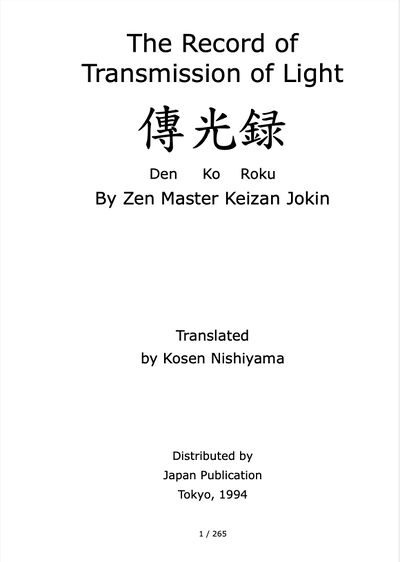- Introduction3
- LEADING CHAPTER SHAKYAMUNI BUDDHA9
- CHAPTER 1 Venerable MAKAKASHO (Mahakasyapa)12
- CHAPTER 2 Venerable ANANDA (Ananda)16
- CHAPTER 3 Venerable SHONAWASHU (Shanavasa)22
- CHAPTER 4 Venerable UBAKIKUTA (Upagupta)26
- CHAPTER 5 Venerable DAITAKA (Dhrtaka)30
- CHAPTER 6 Venerable MISHAKA (Micchaka)34
- CHAPTER 7 Venerable BASHUMITSU (Vasumitra)38
- CHAPTER 8 Venerable BUTSUDANANDAI (Buddhanandai)41
- CHAPTER 9 Venerable FUDAMITTA (Punyamitra)46
- CHAPTER 10 Venerable BARISHIBA (Parshva)49
- CHAPTER 11 Venerable FUNAYASHA (Punyayashas)53
- CHAPTER 12 Venerable ANABOTEI (Ashvagosha)55
- CHAPTER 13 Venerable KABIMARA (Kapimala)59
- CHAPTER 14 Venerable NAGYAHARAJUNA (Nagarjuna)63
- CHAPTER 15 Venerable KANADAIBA (Kanadeva)68
- CHAPTER 16 Venerable RAGORATA (Rahulata)71
- CHAPTER 17 Venerable SOGYANANDAI (Salghanandi)75
- CHAPTER 18 Venerable KAYASHATA (Juyashata)81
- CHAPTER 19 Venerable KUMORATA (Kumarata)87
- CHAPTER 20 Venerable SHAYATA (Jayata)91
- CHAPTER 21 Venerable BASHUBANZU (Vasubandhu)95
- CHAPTER 22 Venerable MANURA (Manora)101
- CHAPTER 23 Venerable KAKUROKUNA (Haklena)105
- CHAPTER 24 Venerable SHISHIBODAI (Simha-Bodhi)109
- CHAPTER 25 Venerable BASHASHITA (Vashashita)113
- CHAPTER 26 Venerable FUNYAMITA (Punyamitra)117
- CHAPTER 27 Venerable HANYATARA (Prajnatara)121
- CHAPTER 28 Venerable BODAIDARUMA (Bodhidharma)125
- CHAPTER 29 Venerable TAISO EKA (Huiko, Chinese)131
- CHAPTER 30 Venerable KANCHI SOSAN (Sengcan)135
- CHAPTER 31 Venerable DAII DOSHIN (Daoxin)139
- CHAPTER 32 Venerable DAIMAN KONIN (Taman Hung jen)143
- CHAPTER 33 Venerable DAIKAN ENO (Huineng)147
- CHAPTER 34 Venerable SEIGEN GYOSHI (Ching Yuan)155
- CHAPTER 35 Venerable SEKITO KISEN (Shitou Wuchi)159
- CHAPTER 36 Venerable YAKUSAN IGEN (Yaoshan)165
- CHAPTER 37 Venerable UNGAN DONJO (Yunyan)169
- CHAPTER 38 Venerable TOZAN RYOKAI (Tung Shan Liang Chieh)173
- CHAPTER 39 Venerable UNGO DOYO (Yun Chu Tao Ying)181
- CHAPTER 40 Venerable DOAN DOHI (T'ung An Taopi)187
- CHAPTER 41 Venerable DOAN KANSHI (Tungan)191
- CHAPTER 42 Venerable RYOZAN ENKAN (Liang Shan Yuan-Kuan)195
- CHAPTER 43 Venerable TAIYO KYOGEN (Ta yang Mingan)201
- CHAPTER 44 Venerable TOSHI GISEI (Tou tsu Iching)205
- CHAPTER 45 Venerable FUYO DOKAI (Fu-Jung Tao-kai)215
- CHAPTER 46 Venerable TANKA SHIJUN (Tan-Hsia Tzu-Ch’un)221
- CHAPTER 47 Venerable CHORO SEIRYO (Ch’ang-lu Ching-lao)223
- CHAPTER 48 Venerable TENDO SOKAKU (T'ien-t'ung Tsung-chüeh)229 * CHAPTER 49 Venerable SETCHO CHIKAN (Hsueh-Tou Chih-Chien)233
- CHAPTER 50 Venerable TENDO NYOJO (T'ient-T'ung Ju-Ching)239
- CHAPTER 51 EIHEI DOGEN245
- CHAPTER 52 KOUN EJO257
[T]he work [Denkōroku] [was] written by Keizan Jokin during the late 13th and early 14th centuries. Keizan began this book with Shakyamuni Buddha as the leading chapter. Denkoroku is a collection of stories about 53 Patriarchs from India, China and Japan and illustrates the enlightenment of each Patriarch – known as the Zen Enlightenment, or Transmission of Light.
Each chapter is started with the Leading Case (本則, Honsoku), Background (機縁, Kien), Dharma Discourse (提拮, Nentei), and Verse (古頌, Juko). When Keizan mentioned each Patriarch he began with the most important point. First, the key tenet as Leading Case (Honsoku). Next, he indicated the background (Kien) of each Patriarch. Some backgrounds are minutely detailed while others are brief and sparse. After a discussion about background, Keizan presented a lengthy interpretation about the Patriarch as Dharma Discourse (Nentei). He followed with his own Verse (Juko) as a short conclusion.
Short stories of each Patriarch are given in this manner so it is easy to follow the accomplishment of each Patriarchs life. Honsoku as Leading Case is the area which indicates the Enlightenment and level of transmission of the Patriarch, while Kien as Background describes the process by which the Patriarch is enabled to practice the transmission. Nentei as Dharma Discourse clarifies the Enlightenment of the Patriarch. Here Keizan teaches the students various interpretations of the Dharma. Finally, Juko (Verse) expresses the spirit of the chapter. Though not necessarily connected with the surface meaning of the chapter, it does express the essence and the conclusion. By making use of the Leading case, background, and dharma discourse, Keizan demonstrates the spiritual tenets which lead to the actual stage of being a Patriarch. In other words, it portrays the Way of Enlightenment. (Nishiyama, introduction, 3–4)
| Citation | Nishiyama, Kosen, trans. The Record of Transmission of Light: Denkōroku. By Zen Master Keizan Jokin. Tokyo: Sasaki Printing and Publishing, 1994. |
|---|---|
Keizan. 傳光録, (Denkōroku), T2585, 82: https://21dzk.l.u-tokyo.ac.jp/SAT/ddb-sat3.php?s=&mode=detail&useid=2585_,82.
The wikipage input value is empty (e.g. <code>, [[]]</code>) and therefore it cannot be used as a name or as part of a query condition.

